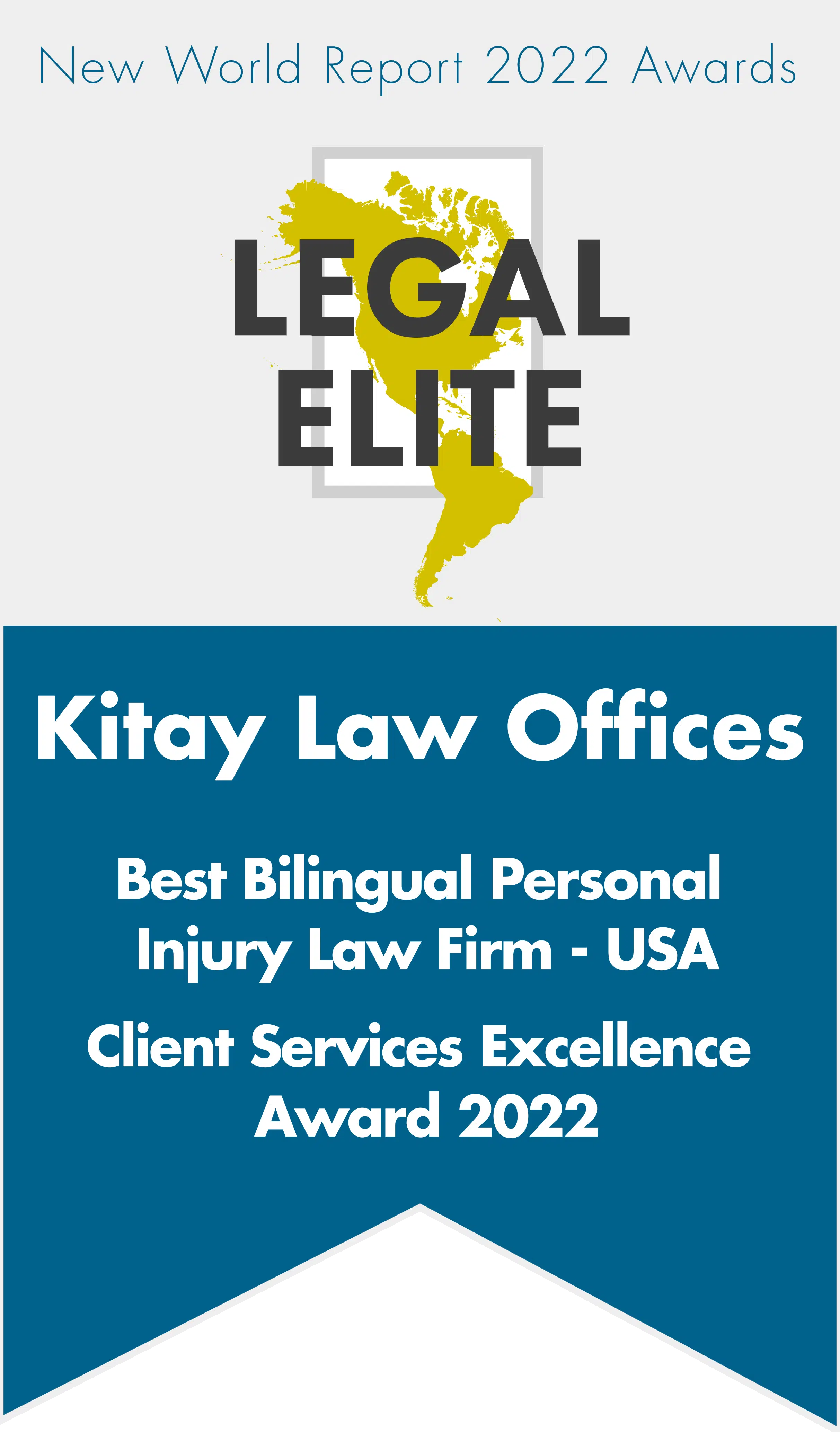An experienced Immigration Lawyer can help you navigate a complex legal system.
Looking for an immigration lawyer to help you with the United States immigration system? The United States is one of the most popular countries for immigration. As a result, the immigration system in the United States is very complex. Therefore, it is important to avoid making mistakes during the immigration process. Finally, missing an application deadline can totally undermine your case.
At Kitay Law Offices, we have a professional team ready to help you and your family with this important process. Contact us online or call 888-KITAYLAW for immigration help today!
Family-Based Immigration to the United States
This is the most common way to immigrate to the United States legally. Simply put, it is immigration based on family relations. For example, this includes when a United States Citizen (USC) or a Lawful Permanent Resident (LPR) sponsors a member of their family to obtain immigrant visas. Having an experienced immigration lawyer on your side gives you the best chance for success in this process.
Sometimes, adjusting status (from immigrant to permanent resident) by applying for a family-sponsored visa may serve as a solution to deportation proceedings.
Generally, there are two categories of family-sponsored immigrant visas: (1) immediate relative; and (2) family preference. This categorization is mainly based on the identity of the sponsoring petitioner and the relationship between the sponsor and the beneficiary relatives. For more information, check out our Family Immigration Lawyer page.
Immediate Relative
The number of visas issued for relatives under the “immediate relative” category is unlimited every fiscal year. Visas or Green Cards are usually available upon the petition’s approval. Therefore, applicants typically enjoy the benefit of a shorter processing time.
Specifically for close family members of U.S. Citizens, an immediate relative includes:
- Spouse (same or opposite sex)
- Children (unmarried minor under the age of 21)
- Parents (the petitioner must be over the age of 21)
Family Preference
This is the category for relatives of permanent residents and more distant family members of U.S. Citizens. Further, this category is divided into the following preference types:
- First Preference (F1) – Unmarried children of U.S. citizens (over the age of 21).
- Second Preference (F2-A) – Spouses and unmarried children (under the age of 21) of permanent residents.
- Second Preference (F2-B) – Unmarried children (above the age of 21) of permanent residents.
- Third Preference (F3) – Married children (of any age) of U.S. citizens.
- Fourth Preference (F4) – Siblings of U.S. citizens (the petitioning citizen must be over the age of 21).
Different from the immediate relative category, family preference has a limited number of visas for immigrants every fiscal year. As a result, the process may take longer. Further, you will want an experienced immigration lawyer on your side guiding you throughout this complex process.
Spousal Visa

Everyone has a right to the “American Dream.”
This is a part of family-sponsored immigration. However, it is designed mostly for spouses of U.S. Citizens.
Depending on how long the marriage has existed, there are two types of spousal visas:
- IR1 Visa – Immediate relative visa, for spouses who are married to a U.S. citizen for over two years. This type of visa permits permanent residency for 10 years.
- CR1 Visa – Conditional residency visa, for spouses who are married to a U.S. citizen for less than two years. This type of visa permits permanent residency for two years.
To apply for any immigrant visa through family-based immigration, the first step is typically to file an I-130 Form (“Petition for Alien Relative”). However, the waiting time can be long. As a result, temporary non-immigrant visas are designed to shorten the time family members spend apart from each other:
- K-3 Visa – Non-immigrant visa for foreign spouses of U.S. citizens. For this visa, you will need to file another I-129 form, in addition to the I-130 form. Once completed, foreign spouses are permitted to travel to the U.S. and unite with their family while waiting for their Green Card cases to proceed.
- Fiancé Visa (K-1 Visa) – Non-immigrant visa for a foreign fiancé. This type of visa lets the fiancé of a U.S. Citizen travel to the U.S. with the condition that they must get married within 90 days.
Provisional Waiver for Unlawful Presence
Unlawful presence is when a foreign person stays in the U.S. without legal permission. If that presence lasts for a certain period, they can be barred from returning for 3-to-10 years after leaving the U.S.
In our family-based immigration context, an applicant typically cannot adjust status while remaining the U.S. if they have a history of unlawful presence. Instead, they will usually have to go to another country to apply for their immigrant visa. However, an exception may apply for a spouse of a United States Citizen. In this case, the spouse may be allowed to adjust their status without having to leave the United States.
Sometimes, we can apply for a provisional waiver of unlawful presence before the applicant leaves. If the immigrant leaves, they will need to seek out a different waiver. Nonetheless, this waiver applies only to inadmissibility on the grounds of unlawful presence. If the application is denied for other reasons, this waiver won’t help.
An Immigration Lawyer can help with Deportation Defense
In simple terms, deportation (removal) is the process of forcing a person who is not a U.S. Citizen to leave the country. The deportation process can be a hard fight. However, there are some defenses we can utilize to avoid removal. Here, it is crucial to have an experienced United States immigration lawyer protecting and fighting for you every step of the way.
Removability
Often times, the first thing to do is to challenge the charges upon which the deportation is based. The strategy here is to raise questions regarding the factual allegations. Importantly, it is the government’s burden to prove its case supporting deportation.
However, this step is usually just a start. Frequently, you can assert other affirmative defenses. For affirmative defenses, we look for particular protections under U.S. law to gain legal immigration status in the process. Some of these defenses are discussed below.
An Immigration Lawyer can help with your request for Asylum
Asylum in the U.S. protects you from persecution in your home country. Importantly, asylum status can lead to grants of work permits and green cards. Further, this may apply for both the refugee and their family.
There are two types of asylum applications:
- Affirmative Asylum Application: The refugee must have already arrived in the U.S. and apply for asylum within one year.
- Defensive Asylum Application: This is the kind of affirmative deportation defense referred to above. Here, the applicant is already in the immigration court for a removal proceeding. At this time, we may request relief from removal based on asylum. Then, the immigration judge will determine if the applicant is eligible for any kind of relief, including asylum.
Deferred Action
Another affirmative defense is having your removal action deferred. Here again, deferred action is subject to the discretion of the court.
Here are two sources of deference that may apply:
- Deferred Action for Childhood Arrivals (DACA): This program is created to temporarily protect foreigners who came to the U.S. in their childhood. Eligible recipients will be safe from deportation for two years. Afterward, DACA candidates have the potential to renew for another two years. However, DACA requirements are subject to constant changes in policy.
- Temporary Protected Status (TPS): Foreign nationals from certain countries with unsafe conditions may receive temporary protection against deportation.
U Visa for Crime Victims – How can an Immigration Lawyer help?
Obtaining a U Visa is another way to seek relief and terminate the deportation process.
For certain crimes, such as murder, rape, and human trafficking, victims may be eligible to apply for a U Visa. Further, you may be eligible for a work permit through this process. While this is not an immigrant visa, U Visa holders can become eligible for permanent residence if they maintain a valid U Visa for three years.
Eligibility requirements for a U Visa include:
- Being a victim of certain crimes
- Having suffered from these crimes
- Having helped with law enforcement’s investigation of these crimes
- Signed certificate from a law enforcement official (Form I-918)
Finally, once approved, the U Visa establishes a legal immigration status and the deportation process ends. As you can see, each of these deportation defenses includes specific requirements. Further, the legal system is complex and can be intimidating. Therefore, contact an experienced immigration lawyer at Kitay Law Offices for help immediately. You can reach us online or by calling 888-KITAYLAW.
A Kitay Law Offices Immigration Lawyer can help with other immigration issues, as well
There are many other issues related to immigration law for which we provide legal services. Here are some examples.
Crimmigration
Just as the name suggests, crimmigration is where criminal law and immigration law meet. In practice, it is where criminal (or even disciplinary) charges affect a person’s immigration status.
There are two main criminal grounds for deportation:
- Aggravated felonies: These include crimes such as murder, rape, and drug trafficking.
- Crimes involving moral turpitude (CIMT): This usually involves crimes related to dishonesty, such as fraud and theft. Assault crimes, like domestic violence, can also be grouped under CIMT. Importantly, there may be room for argument as to whether the crime you have been charged with actually qualifies as a CIMT.
In a nutshell, conviction of a fairly minor crime may result in deportation. Sometimes, in the case of international students, disciplinary charges can easily cause problems for their F-1 visa status.
Crimmigration affects any non-U.S. citizen living in the U.S. A history of criminal convictions likely violates the “good moral character” requirement in immigration applications. Additionally, it can easily jeopardize a person’s immigration status or their future candidacy for a Green Card or citizenship. Therefore, it is very important for immigrants to seek advice from lawyers who are experienced in both criminal and immigration law.
Naturalization
Naturalization is the process through which a Green Card holder becomes a legal U.S. Citizen. Importantly, you must meet many requirements in order to obtain citizenship:
- English literacy: The applicant must take an English literacy test to demonstrate their ability to read, write, and speak English. In addition, the applicant should also have a basic understanding of American civics.
- Lawful permanent resident: The applicant must be lawfully living in the United States for at least five years. Also, the applicant is required to be in the country physically for at least half of that five-year period.
- Good moral character: The applicant must demonstrate good moral character. Here, USCIS bases the evaluation by way of common community standards.
- Oath of Allegiance: The applicant must take the Oath of Allegiance to the United States. Importantly, the process is not complete until you take this oath.
Depending on the basis of permanent residency, the requirements can vary.
For example, an applicant married to a U.S. Citizen is not subject to the five-year period. Instead, the mandatory period is three years, both for the time living in the country and being married to the citizen.
To start the application for naturalization, you’ll want an experienced immigration lawyer guiding you through the process. Once the initial process is complete, you will complete an interview with USCIS. After the interview, the USCIS will mail the decision to the applicant. To get started, contact us online or at 888-KITAYLAW.
Work Permits
The USCIS can issue a work permit called an Employment Authorization Document (EAD).
Working in the U.S. legally requires a valid work permit. Remember, serious consequences may come from working without a permit. Importantly, this may include deportation and denial of future entry and visa applications.
A lot of visa programs come with work permits. These include:
- Green Card holders
- DACA/TPS recipients
- Refugees with Asylum Status
- Spousal and Fiancé Visa holders
- F-1 students during OPT
- Other Work Visa holders
Interestingly, work visas double as work permits, which means you don’t need to apply separately for a permit to work. The most popular type of work visa is the H-1B Visa, for people in a specialty occupation. You must have the following to be eligible for an H-1B visa:
- Higher education degree – Bachelor’s degree or higher.
- Employer as sponsor – The employer of the applicant must file a Form ETA-9035 and a petition (Form I-129) for the employee.
The U.S. limits the number of H-1B visa approvals each year. However, once granted, the visa holder can live and work in the U.S. for three years (you may also receive an extension of six years by filing a new Form I-129).
An Immigration Lawyer at Kitay Law Offices can help if you speak Spanish
At Kitay Law Offices, we work to help you and your family live the American Dream. Further, virtually our entire staff is bilingual in both English and Spanish. So, if you’re looking for a Spanish-speaking law firm, we can help. ¡Se habla español!
To speak with an experienced immigration lawyer, contact us today! You can reach online or by calling 888-KITAYLAW.

